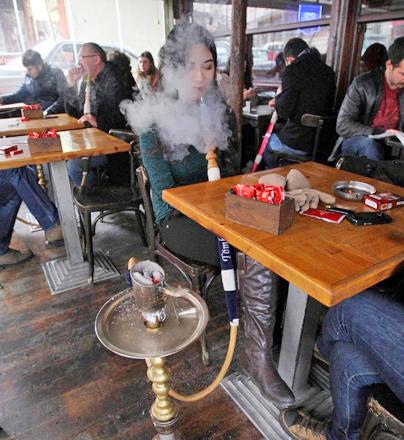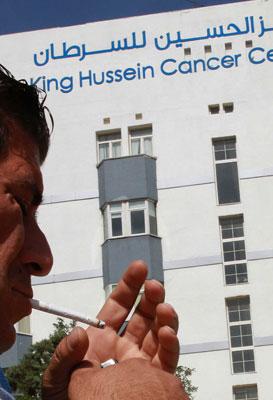You are here
‘Tobacco harms the health, Treasury and spirit of Jordan’
By JT - Jun 11,2018 - Last updated at Jun 11,2018

Every year, more than 3,100 Jordanians are killed by tobacco-caused disease (File photo)
AMMAN — Every year on May 31, the World Health Organisation and partners around the world mark World No Tobacco Day, highlighting the health and other risks associated with tobacco use, and advocating for effective policies to reduce tobacco consumption, a statement by the King Hussein Cancer Centre (KHCC) said.
“This day is considered one of the most important awareness days in the world, which aims to encourage smokers to quit smoking and pay attention to their physical and mental health away from tobacco toxins,” said Asesem Mansour, KHCC director general, urging young people to “stay away from these toxins due to their bad effects on the health, the Treasury, and the spirit of Jordan”.
This year’s World No Tobacco Day 2018 was held under the theme “tobacco and heart disease”.
Chief section of the pulmonary and critical care and director of the cancer office at KHCC, Firas Al Hawari said that Jordan is “one of the highest countries in the prevalence of tobacco consumption in the region and the world”.
Every year, more than 3,100 Jordanians are killed by a tobacco-caused disease, which means 61 deaths per week. Still, more than 9,000 children aged between ten and 14 years old and 1.051 million people over 15 years of age continue to use tobacco each day, according to the Tobacco Atlas 2018.
“These terrifying numbers reflect the level of awareness among Jordanians, which is at the lowest level,” the statement said, stressing “significant steps must be done at the level of civil society and government to reduce the spread of tobacco”.
“Hookah, which has become part of Jordanian culture, is now promoted as a safer alternative for cigarettes but the fact is, it is not less harmful than cigarettes,” the statement continued, citing the fact that smoking (both cigarettes and hookah) accounts for 26 per cent of cancers in males in Jordan, particularly cancers of the lung, throat, pharynx, bladder, head and neck.
Recent studies also showed that smoking plays a major role in breast cancer. “Smoking doesn’t cause breast cancer only, but also helps in its return after treatment and its spread to other parts of the body,” the statement read, adding that it also applies to colon cancer, which is the number one cancer in Jordanian males.
There are other major consequences for smoking tobacco, which are not limited to cancer alone: while 16 per cent of Jordan’s deaths are due to cancers, 37 per cent of Jordan’s deaths are due to cardiovascular disease, according to the Ministry of Health.
Studies also indicate that active smoking is prospectively associated with around 50 per cent increased risk of total mortality and cardiovascular events.
Furthermore, research has shown that smoking increases the risk of type 2 diabetes, with diabetic patients being more likely to have complications such as kidney problems, nerve pain and increase in the incidence of retinal diseases.
The KHCC called on tobacco treatment to be covered by health insurance, so as to assist addicts seeking help to find medical assistance and begin treatment.
“A key factor in reducing tobacco prevalence and diseases is the ban of smoking in public places, which is part of the national tobacco control strategy,” the statement said, noting that “a firm implementation of anti-smoking law in public places could reduce the proportion of smokers in Jordan by 4 per cent in a year, and reduce the incidence of sudden heart failure, and heart stroke, which is the number one killer in Jordan”.
Related Articles
AMMAN — A training workshop on tobacco addiction treatment was held on Sunday at King Hussein Cancer Centre (KHCC) to illustrate the differe
AMMAN — The King Hussein Cancer Foundation (KHCF) on Wednesday held a virtual session for reporters to raise awareness about issues related
AMMAN — Yazeed was 12 years old when he had his first shisha, an instrument for vaporising and smoking flavoured tobacco.
















